- Home
- Octavia E. Butler
Mind of My Mind
Mind of My Mind Read online
Mind of My Mind
The Patternist Series
Octavia Butler
For Octavia, M., Harlan and Sid.
Contents
Prologue
PART ONE
Chapter One
Chapter Two
Chapter Three
PART TWO
Chapter Four
Chapter Five
Chapter Six
Chapter Seven
Chapter Eight
PART THREE
Chapter Nine
Chapter Ten
Chapter Eleven
Chapter Twelve
Epilogue
A Biography of Octavia Butler
Prologue
Doro
Doro’s widow in the southern California city of Forsyth had become a prostitute. Doro had left her alone for eighteen months. Too long. For the sake of the daughter she had borne him, he should have visited her more often. Now it was almost too late.
Doro watched her without letting her know that he was in town. He saw the men come and go from her new, wrong-side-of-the-tracks apartment. He saw that most of her time away from home was spent in the local bars.
Sometime during his eighteen-month absence, she had moved from the house he had bought her—an expensive house in a good neighborhood. And though he had made arrangements with a Forsyth bank for her to receive a liberal monthly allowance, she still needed the men. And the liquor. He was not surprised.
By the time he knocked at her door, the main thing he wanted to do was see whether his daughter was all right. When the woman opened the door, he pushed past her into the apartment without speaking.
She was half drunk and slurred her words a little as she called after him. “Hey, wait a minute. Who the hell do you think you—”
“Shut up, Rina.”
She hadn’t recognized him, of course. He was wearing a body that she had never seen before. But like all his people, she knew him the instant he spoke. She stared at him, round-eyed, silent.
There was a man sitting on her couch drinking directly from a bottle of Santa Fe Port. Doro glanced at him, then spoke to Rina. “Get rid of him.”
The man started to protest immediately. Doro ignored him and went on to the bedroom, following his tracking sense to Mary, his daughter. The child was asleep, her breathing softly even. Doro turned on a light and looked at her more closely. She was three years old now, small and thin, not especially healthy-looking. Her nose was running.
Doro touched her forehead lightly but felt no trace of fever. The bedroom contained only a bed and a three-legged chest of drawers. There was a pile of dirty clothes in one corner on the floor. The rest of the floor was bare wood—no carpeting.
Doro took in all this without surprise, without changing his neutral expression. He uncovered the child, saw that she was sleeping nude, saw the bruises and welts on her back and legs. He shook his head and sighed, covered the little girl up carefully, and went back out to the living room. There the man and Rina were cursing at each other. Doro waited in silence until he was sure that Rina was honestly, in fact desperately, trying to get rid of her “guest” but that the man was refusing to budge. Then Doro walked over to the man.
The man was short and slight, not much more than a boy, really. Rina might have been able to throw him out physically, but she had not. Now it was too late. She stumbled back away from him, silent, abruptly terrified as Doro approached.
The man rose unsteadily to face Doro. Doro saw that he had put his bottle down and taken out a large pocket knife. Unlike Rina, he did not slur his words at all when he spoke. “Now, listen, you—Hold it! I said hold it!”
He broke off abruptly, slashing at Doro as Doro advanced on him. Doro made no effort to avoid the knife. It sliced easily through the flesh of his abdomen but he never felt the pain. He abandoned his body the instant the knife touched him.
Surprise and anger were the first emotions Doro tasted in the man’s mind. Surprise, anger, then fear. There was always fear. Then yielding. Not all Doro’s victims gave in so quickly, but this one was half anesthetized with wine. This one saw Doro as only Doro’s victims ever saw him. Then, stunned, he gave up his life almost without a struggle. Doro consumed him, an easy if not especially satisfying meal.
Rina had gasped and begun to raise her hand to her mouth as the man slashed at Doro. When Doro finished his kill, Rina’s hand was just touching her lips.
Doro stood uncomfortably disoriented, mildly sick to his stomach, the hand of his newly acquired body still clutching its bloody knife. On the floor lay the body that Doro had been wearing when he came in. It had been strong, healthy, in excellent physical condition. The one he had now was nothing beside it. He glanced at Rina in annoyance. Rina shrank back against the wall.
“What’s the matter with you?” he asked. “Do you think you’re safer over there?”
“Don’t hurt me,” she said. “Please.”
“Why would you beat a three-year-old like that, Rina?”
“I didn’t do it! I swear. It was a guy who brought me home a couple of nights ago. Mary woke up screaming from a nightmare or something, and he—”
“Hell,” said Doro in disgust. “Is that supposed to be an excuse?”
Rina began to cry silently, tears streaming down her face. “You don’t know,” she said in a low voice. “You don’t understand what it’s like for me having that kid here.” She was no longer slurring her words, in spite of her tears. Her fear had sobered her. She wiped her eyes. “I really didn’t hit her. You know I wouldn’t dare lie to you.” She stared at Doro for a moment, then shook her head. “I’ve wanted to hit her though—so many times. I can hardly even stand to go near her sober anymore. …” She looked at the body cooling on the floor and began to tremble.
Doro went to her. She stiffened with terror as he touched her. Then, after a moment, when she realized that he was doing nothing more than putting his arm around her, she let him lead her back to the couch.
She sat with him, beginning to relax, the tension going out of her body. When he spoke to her, his tone was gentle, without threat.
“I’ll take Mary if you want me to, Rina. I’ll find a home for her.”
She said nothing for a long while. He did not hurry her. She looked at him, then closed her eyes, shook her head. Finally she put her head on his shoulder and spoke softly. “I’m sick,” she said. “Tell me I’ll be well if you take her.”
“You’ll be as well as you were before Mary was born.”
“Then?” She shuddered against him. “No. I was sick then too. Sick and alone. If you take Mary away, you won’t come back to me, will you?”
“No. I won’t.”
“You said, ‘I want you to have a baby,’ and I said, ‘I hate kids, especially babies,’ and you said, That doesn’t matter.’ And it didn’t.”
“Shall I take her, Rina?”
“No. Are you going to get rid of that corpse for me?” She nudged his former body with one foot.
“I’ll have someone take care of it.”
“I can’t do anything,” she said. “My hands shake and sometimes I hear voices. I sweat and my head hurts and I want to cry or I want to scream. Nothing helps but taking a drink—or maybe finding a guy.”
“You won’t drink so much from now on.”
There was another long silence. “You always want so damn much. Shall I give up men, too?”
“If I come back and find Mary black and blue again, I’ll take her. If anything worse happens to her, I’ll kill you.”
She looked at him without fear. “You mean I can keep my men if I keep them away from Mary. All right.”
Dora sighed, started to speak, then shrugged.
“I can’t help it,�
�� she said. “Something is wrong with me. I can’t help it.”
“I know.”
“You made me what I am. I ought to hate your guts for what you made me.”
“You don’t hate me. And you don’t have to defend yourself to me. I don’t condemn you.” He caressed her, wondering idly how she could want life badly enough to fight as hard as she had to fight to keep it. In producing her daughter, she had performed the function she had been born to perform. Doro had demanded that much of her as he had demanded it of others, her ancestors long before her. There had been a time when he disposed of people like her as soon as they had produced the number of offspring he desired. They were inevitably poor parents and their children grew up more comfortably with adoptive parents. Now, though, if such people wanted to live after having served him, he let them. He treated them kindly, as servants who had been faithful. Their gratitude often made them his best servants in spite of their seeming weakness. And the weakness didn’t bother him. Rina was right. It was his fault—a result of his breeding program. Rina, in fact, was a minor favorite with him when she was sober.
“I’ll be careful,” she said. “No one will hurt Mary again. Will you stay with me for a while?”
“Only for a few days. Long enough to help you move out of here.”
She looked alarmed. “I don’t want to move. I can’t stand it out there where I was, by myself.”
“I’m not going to send you back to our old house. I’m just going to take you a few blocks over to Dell Street where one of your relatives lives. She has a duplex and you’re going to live in one side of it.”
“I don’t have any relatives left alive around here.”
He smiled. “Rina, this part of Forsyth is full of your relatives. Actually, that’s why you came back to it. You don’t know them, and you wouldn’t like most of them if you met them, but you need to be close to them.”
“Why?”
“Let’s just say, so you won’t be by yourself.”
She shrugged, neither understanding nor really caring. “If people around here are my relatives, are they your people too?”
“Of course.”
“And … this woman I’m going to live next door to—what is she to me?”
“Your grandmother several times removed.”
Rina’s terror returned full force. “You mean she’s like you? Immortal?”
“No. Not like me. She doesn’t kill—at least not the way I do. She’s still wearing the same body she was born into. And she won’t hurt you. But she might be able to help with Mary.”
“All for Mary. She must be important, poor kid.”
“She’s very important.”
Rina was suddenly the concerned mother, frowning at him worriedly. “She won’t just be like me? Sick? Crazy?”
“She’ll be like you at first, but she’ll grow out of it. It isn’t really a disease, you know.”
“It is to me. But I’ll keep her, and move, like you said, to this grandmother’s house. What’s the woman’s name?”
“Emma. She started to call herself Emma about one hundred fifty years ago as a joke. It means grandmother or ancestress.”
“It means she’s somebody you can trust to watch me and see that I don’t hurt Mary.”
“Yes.”
“I won’t. I’ll learn to be her mother at least … a little more. I can do that much—raise a child who’ll be important to you.”
He kissed her, believing her. If the child had not been such an important part of his breeding program, he would not have put a watch on her at all. After a while he got up and went to call one of his people to come and get his former body out of the apartment.
Emma
Emma was in the kitchen fixing her breakfast when she heard someone at her front door. She hobbled through the dining room toward the door, but before she could reach it, it opened and a slight young man stepped in.
Emma stopped where she was, straightened her usually bent body, and stared a question at the young man. She was not afraid. A couple of boys had broken in to rob her recently and she had given them quite a surprise.
“It’s me, Em,” said the young man, smiling.
Emma relaxed, smiled herself, but she did not let her body sink back into its stoop. “What are you doing here? You’re supposed to be in New York.”
“I suddenly realized that it had been too long since I checked on one of my people.”
“You don’t mean me.”
“A relative of yours—a little girl.”
Emma raised an eyebrow at him, then drew a deep breath. “Let’s sit down, Doro. Ask me the favor you’re going to ask me from a comfortable chair.”
He actually looked a little sheepish. They sat down in the living room.
“Well?” said Emma.
“I see you have someone living in your other apartment,” he said.
“Family,” said Emma. “A great-grandson whose wife just died. He works and I keep an eye on the kids when they get home from school.”
“How soon can you move him out?”
Emma stared at him expressionlessly. “The question is, will I move him out at all? Why should I?”
“I have a youngster who’s going to be too much for her mother in a few years. Right now, though, her mother is too much for her.”
“Doro, the kids next door really need my help. Even with guidance, you know they’re going to have a hard time.”
“But almost anyone could help those children, Em. On the other hand, you’re just about the only one I’d trust to help the child I’m talking about.”
Emma frowned. “Her mother abuses her?”
“So far, she only lets other people abuse her.”
“Sounds as though the child would be better off adopted into another family.”
“I don’t want to do that if I can avoid it. She’s probably going to have a strong need to be among her relatives. And you’re the only relative she has that I’d care to trust her with. She’s part of an experiment that’s important to me, Em.”
“Important to you. To you! And what shall I do with my great-grandson and his children?”
“Surely one of your apartment complexes has a vacancy. And you can pay a babysitter for the kids. You’re already providing for God knows how many indigent relatives. This should be fairly easy.”
“That’s not the point.”
He leaned back and sat looking at her. “Are you going to turn me down?”
“How old is the child?”
“Three.”
“And just what is she going to grow up into?”
“A telepath. One with more control of her ability than any I’ve produced so far, I hope. And from the body I used to father her, I hope she’ll have inherited a few other abilities.”
“What other abilities?”
“Em, I can’t tell you all of it. If I do, in a few years she’ll read it in your mind.”
“What difference would that make? Why shouldn’t she know what she is?”
“Because she’s an experiment. It will be better for her to learn the nature of her abilities slowly, from experience. If she’s anything like her predecessors, the more slowly she learns the better it will be for the people around her.”
“Who were her predecessors?”
“Failures. Dangerous failures.”
Emma sighed. “Dead failures.” She wondered what he would say if she refused to help. She didn’t like having anything to do with his projects when she could help it. They always involved children, always had to do with his breeding programs. For all but the first few centuries of his four-thousand-year life, he had been struggling to build a race around himself. He existed apparently as a result of a mutation millennia past. His people existed as a result of less wildly divergent mutations and as a result of nearly four thousand years of controlled breeding. He now had several strong mutant strains, which he combined or kept separate, as he wished. And behind him he had an untold number of failures, dange
rous or only pathetic, which he had destroyed as casually as other people slaughtered cattle.
“You must tell me something about your hopes for the girl,” Emma said. “Just what kind of danger are you trying to expose me to?”
He laid a hand on her bony shoulder. “Very little, Em. If you have a hand in raising the girl, she should come out reasonably controllable. In fact, I was thinking of giving you the whole job of raising her.”
“No! Absolutely not. I’ve raised enough children. More than enough.”
“That’s what I thought you’d say. All right. Just let me move her and her mother in next door, where you can keep an eye on them.”
“What are you going to do with her after she’s matured?—if she’s a success, I mean.”
He sighed. “Well, I guess I can tell you that. She’s part of my latest attempt to bring my active telepaths together. I’m going to try to mate her with another telepath without killing either of them myself. And I’m hoping that she and the boy I have in mind are stable enough to stay together without killing each other. That will be a beginning.”
Emma shook her head as he spoke. How many lives had he thrown away over the years in pursuit of that dream? “Doro, they’ve never been together. Why don’t you leave them alone? Let them stay separate. They avoid each other naturally when you’re not pushing them together.”
“I want them together. Did you think I had given up?”
“I keep hoping you’ll give up for the sake of your people.”
“And settle for the string of warring tribes that I’ve got now? Not that most of them are even that united. Just families of people who don’t like their own members much even though they usually need to be near them. Families who can’t tolerate members of my other families at all. They all tolerate ordinary people well enough, though. They would have merged back into the general population long ago if I didn’t police them.”
“Perhaps they should. They would be happier.”
“Would you be happier without your gifts, Emma? Would you like to be an ordinary human?”
“Of course not. But how many others are in full control of their abilities, as I am? And how many spend their lives in abject misery because they have ‘gifts’ that they can’t control or even understand?” She sighed. “You can’t take credit for me, anyway. I’m almost as much of an accident as you are. My people had been separated from one of your families for hundreds of years before I was born. They had merged with the people they took refuge among, and they still managed to produce me.”

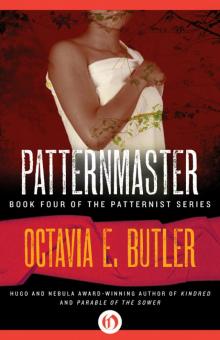 Patternmaster
Patternmaster Survivor
Survivor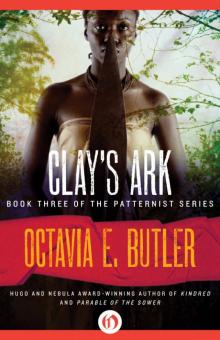 Clay's Ark
Clay's Ark Bloodchild and Other Stories
Bloodchild and Other Stories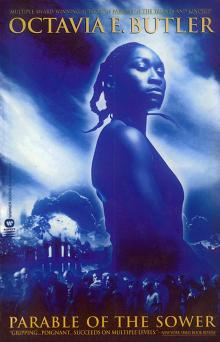 Parable of the Sower
Parable of the Sower Wild Seed
Wild Seed Fledgling
Fledgling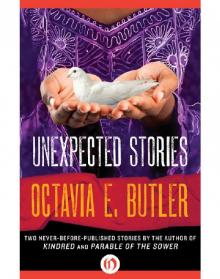 Unexpected Stories
Unexpected Stories Kindred
Kindred Lilith's Brood: Dawn / Adulthood Rites / Imago
Lilith's Brood: Dawn / Adulthood Rites / Imago Adulthood Rites
Adulthood Rites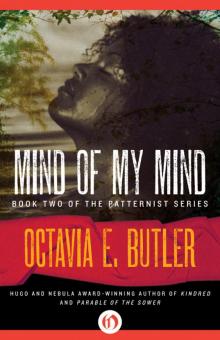 Mind of My Mind
Mind of My Mind Seed to Harvest
Seed to Harvest Lilith's Brood: Dawn, Adulthood Rites, and Imago (Xenogenesis Trilogy)
Lilith's Brood: Dawn, Adulthood Rites, and Imago (Xenogenesis Trilogy) Bloodchild
Bloodchild Seed to Harvest: Wild Seed, Mind of My Mind, Clay's Ark, and Patternmaster (Patternist)
Seed to Harvest: Wild Seed, Mind of My Mind, Clay's Ark, and Patternmaster (Patternist)